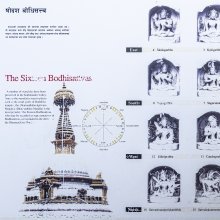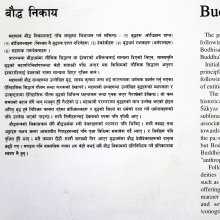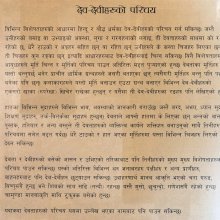Aru, Āru, Ārū, Āṟukaṭṭu: 15 definitions
Introduction:
Aru means something in Hinduism, Sanskrit, Buddhism, Pali, Jainism, Prakrit, biology, Tamil. If you want to know the exact meaning, history, etymology or English translation of this term then check out the descriptions on this page. Add your comment or reference to a book if you want to contribute to this summary article.
Images (photo gallery)
In Hinduism
Vyakarana (Sanskrit grammar)
Source: Wikisource: A dictionary of Sanskrit grammarĀru (आरु).—kṛt. affix applied to the roots शृ (śṛ) and वन्द् (vand) in the sense of habituated etc. e.g. शरारुः, वन्दारुः (śarāruḥ, vandāruḥ), cf P. III. 2.173.

Vyakarana (व्याकरण, vyākaraṇa) refers to Sanskrit grammar and represents one of the six additional sciences (vedanga) to be studied along with the Vedas. Vyakarana concerns itself with the rules of Sanskrit grammar and linguistic analysis in order to establish the correct context of words and sentences.
Ayurveda (science of life)
Source: gurumukhi.ru: Ayurveda glossary of termsAru (अरु):—Ulcer

Āyurveda (आयुर्वेद, ayurveda) is a branch of Indian science dealing with medicine, herbalism, taxology, anatomy, surgery, alchemy and related topics. Traditional practice of Āyurveda in ancient India dates back to at least the first millenium BC. Literature is commonly written in Sanskrit using various poetic metres.
Biology (plants and animals)
Source: Google Books: CRC World Dictionary (Regional names)1) Aru in India is the name of a plant defined with Abrus precatorius in various botanical sources. This page contains potential references in Ayurveda, modern medicine, and other folk traditions or local practices It has the synonym Abrus abrus W.F. Wright (among others).
2) Aru is also identified with Armeniaca vulgaris It has the synonym Prunus armeniaca L..
3) Aru is also identified with Rhododendron arboreum.
4) Aru in Malaysia is also identified with Casuarina equisetifolia It has the synonym Casuarina littorea L. (etc.).
Example references for further research on medicinal uses or toxicity (see latin names for full list):
· Contributions from the United States National Herbarium (1905)
· Herb. Amboin. (1743)
· Characteres Generum Plantarum (1775)
· Smithsonian Contributions to Botany (1975)
· Familles des Plantes (1763)
· Kew Bulletin (1970)
If you are looking for specific details regarding Aru, for example chemical composition, health benefits, side effects, pregnancy safety, diet and recipes, extract dosage, have a look at these references.

This sections includes definitions from the five kingdoms of living things: Animals, Plants, Fungi, Protists and Monera. It will include both the official binomial nomenclature (scientific names usually in Latin) as well as regional spellings and variants.
Languages of India and abroad
Pali-English dictionary
Source: BuddhaSasana: Concise Pali-English Dictionaryaru : (nt.) an old wound; a sore.
Source: Sutta: The Pali Text Society's Pali-English DictionaryAru, (nt.) (Vedic aruḥ, unknown etym. ) a wound, a sore, only in cpds. : °kāya a heap of sores M. II, 64 = Dh. 147 = Th. 1, 769 (= navannaṃ vaṇamukhānaṃ vasena arubhūta kāya DhA. III, 109 = VvA. 77); °gatta (adj.) with wounds in the body M. I, 506 (+ pakka-gatta); Miln. 357 (id); °pakka decaying with sores S. IV, 198 (°āni gattāni); °bhūta consisting of wounds, a mass of wounds VvA. 77 = DhA. III, 109. (Page 78)

Pali is the language of the Tipiṭaka, which is the sacred canon of Theravāda Buddhism and contains much of the Buddha’s speech. Closeley related to Sanskrit, both languages are used interchangeably between religions.
Sanskrit dictionary
Source: DDSA: The practical Sanskrit-English dictionaryAru (अरु).—
1) The sun.
2) Name of a plant (raktakhadira).
Derivable forms: aruḥ (अरुः).
--- OR ---
Āru (आरु).—2 P.
1) To cry out, shout; Bhaṭṭikāvya 17.24, to low (as cows).
2) To praise.
--- OR ---
Āru (आरु).—[ṛ-uṇ]
1) A hog.
2) A crab.
3) Name of a tree.
-ruḥ f. A pitcher.
Derivable forms: āruḥ (आरुः).
--- OR ---
Ārū (आरू).—a. Of a tawny colour.
-rū m.
1) The tawny colour.
2) A hog; a crab; see आरु (āru).
3) Name of a medicinal plant on the Himālaya.
Source: Cologne Digital Sanskrit Dictionaries: Shabda-Sagara Sanskrit-English DictionaryĀru (आरु).—m.
(-ruḥ) 1. The name of a tree, (Lagerstrœmia regina.) 2. A crab. 3. A hog. 4. A pitcher. E. ṛ to go, uṇ affix, the pen. made long.
--- OR ---
Ārū (आरू).—mfn. (-rūḥ-rūḥ-ru) Of a tawny colour. m.
(-rūḥ) Tawny, (the colour.) E. ṛ to go, ū aff.
Source: Cologne Digital Sanskrit Dictionaries: Cappeller Sanskrit-English DictionaryAru (अरु).—(°—) = arus [neuter]
Source: Cologne Digital Sanskrit Dictionaries: Monier-Williams Sanskrit-English Dictionary1) Aru (अरु):—a m. the sun, [cf. Lexicographers, esp. such as amarasiṃha, halāyudha, hemacandra, etc.]
2) the red-blossomed Khadira tree, [cf. Lexicographers, esp. such as amarasiṃha, halāyudha, hemacandra, etc.]
3) for arus n. only in [compound] with -ṃ-tuda
4) [from arus] b See sub voce
5) Āru (आरु):—[=ā-ru] 1. ā-√1. ru [Parasmaipada] -rauti or -ravīti ([imperative] ā-ruva, [Ṛg-veda i, 10, 4]) to shout or cry towards;
—to cry out, [Varāha-mihira’s Bṛhat-saṃhitā; Rāmāyaṇa; Bhaṭṭi-kāvya];
—to praise, [cf. Lexicographers, esp. such as amarasiṃha, halāyudha, hemacandra, etc.] :
—[Intensive] -roravīti, to roar towards or against, [Ṛg-veda]
6) 2. āru m. a hog
7) a crab
8) the tree Lagerstroemia Regina, [cf. Lexicographers, esp. such as amarasiṃha, halāyudha, hemacandra, etc.]
9) f. a pitcher, [cf. Lexicographers, esp. such as amarasiṃha, halāyudha, hemacandra, etc.]
10) Ārū (आरू):—mfn. (√ṛ [Uṇādi-sūtra i, 87]), tawny
11) m. (ūs) tawny (the colour), [cf. Lexicographers, esp. such as amarasiṃha, halāyudha, hemacandra, etc.]
Source: Cologne Digital Sanskrit Dictionaries: Yates Sanskrit-English Dictionary1) Āru (आरु):—(ruḥ) 1. m. (Lagerstroemia regina); a crab; a hog; a pitcher.
2) Ārū (आरू):—[(rūḥ-ru) a.] Tawny.
[Sanskrit to German]
Sanskrit, also spelled संस्कृतम् (saṃskṛtam), is an ancient language of India commonly seen as the grandmother of the Indo-European language family (even English!). Closely allied with Prakrit and Pali, Sanskrit is more exhaustive in both grammar and terms and has the most extensive collection of literature in the world, greatly surpassing its sister-languages Greek and Latin.
Prakrit-English dictionary
Source: DDSA: Paia-sadda-mahannavo; a comprehensive Prakrit Hindi dictionaryAru (अरु) in the Prakrit language is related to the Sanskrit word: Aruj.
Prakrit is an ancient language closely associated with both Pali and Sanskrit. Jain literature is often composed in this language or sub-dialects, such as the Agamas and their commentaries which are written in Ardhamagadhi and Maharashtri Prakrit. The earliest extant texts can be dated to as early as the 4th century BCE although core portions might be older.
Kannada-English dictionary
Source: Alar: Kannada-English corpusAru (ಅರು):—[verb] to have a longing for; to want; to desire; to crave; to wish.
--- OR ---
Aru (ಅರು):—
1) [noun] the tropical hot red pepper plant, Capsicum annuum of Solanaceae family, common chilli.
2) [noun] its pod;(?).
--- OR ---
Aru (ಅರು):—
1) [noun] a sore, usu. infected spot on the body, as an ulcer, boil or blister.
2) [noun] a critical or indispensable part (of the body).
--- OR ---
Aṟu (ಅಱು):—[verb] to become dry; to lose moisture.
--- OR ---
Aṟu (ಅಱು):—[noun] the tender feeling for another; love; affection.
--- OR ---
Aṟu (ಅಱು):—[adjective] (in compounds only) totalling one more than five; six.
--- OR ---
Āru (ಆರು):—[verb] to cry or shout aloud; to roar.
--- OR ---
Āru (ಆರು):—
1) [verb] to be satisfied; to get satisfaction.
2) [verb] to be filled; to become full.
--- OR ---
Āru (ಆರು):—
1) [verb] to be able to; to be capable of.
2) [verb] to bear; to endure.
--- OR ---
Āru (ಆರು):—
1) [verb] (lamp, fire etc.) to be put of; to become extinguished.
2) [verb] to become calm.
3) [verb] to become cool or colder.
4) [verb] to become dry; to lose water contents.
5) [verb] to be pacified.
6) [verb] (wound) to get healed up.
7) [verb] ಆರಿಹೋಗುವ ದೀಪ [arihoguva dipa] (ಜೋರಾಗಿ ಉರಿಯುತ್ತದೆ [joragi uriyuttade]) ārihōguva dīpa (jōrāgi uriyuttade) (fig.) a dying person (who seemingly looks brighter or more active than actually he or she is).
--- OR ---
Āru (ಆರು):—[noun] a plough yoked to a pair of oxen.
--- OR ---
Āru (ಆರು):—[adjective] totalling one more than five; six.
--- OR ---
Āru (ಆರು):—
1) [noun] the cardinal number between five and seven; six.
2) [noun] ಆರಕ್ಕೆ ಏರದೆ, ಮೂರಕ್ಕೆ ಇಳಿಯದೆ ಇರು [arakke erade, murakke iliyade iru] ārakke ērade mūrakke iḷiyade iru to have no ups and downs; to be in or maintain, an optimum level; ಆರು ದೋಸೆ ಕೊಟ್ಟರೆ ಅತ್ತೆಯ ಕಡೆ, ಮೂರು ದೋಸೆ ಕೊಟ್ಟರೆ ಸೊಸೆಯ ಕಡೆ [aru dose kottare atteya kade, muru dose kottare soseya kade] āru dōse koṭṭare a tteya kaḍe, mūru dōse koṭṭare soseya kaḍe to have no firm conviction of one’s own; to be susceptible easily to bribe in giving the judgement, in giving a witness, etc. ಆರು ಹೆತ್ತವಳಿಗೆ ಮೂರು ಹೆತ್ತವಳು ಮುಲುಕು ಕಲಿಸಿದಳಂತೆ [aru hettavalige muru hettavalu muluku kalisidalamte] āṛu hettavaḷige mūru hettavaḷu muluku kalisidaḷante teach your grand mother to suck eggs; ಆರು ಯತ್ನ ತನ್ನದು, ಏಳನೆಯದು ದೈವೇಚ್ಛೆ [aru yatna tannadu, elaneyadu daivecche] āṛu yatna tannadu, ēḷaneyadu daivēcche do all you can, and leave the rest to providence.
--- OR ---
Āru (ಆರು):—
1) [noun] any swine, esp. the unweaned young of the thick-bodied domesticated species (Sus scrofa); pig.
2) [noun] a decapod with four pairs of legs, one pair of pincers, a flattish shell, and a short, broad abdomen folded under its thorax; a crab.
3) [noun] a utensil for holding something, as a bowl, pot, kettle, etc.
--- OR ---
Āru (ಆರು):—
1) [pronoun] what or which person or persons.
2) [pronoun] a or the person or persons (used in relative clauses) .
--- OR ---
Āru (ಆರು):—[noun] the drawing of inferences or conclusions from known or assumed facts; use of reason.
--- OR ---
Āru (ಆರು):—
1) [verb] to put yoke on a pair of oxen.
2) [verb] to carry on agricultural activity.
--- OR ---
Āṟu (ಆಱು):—
1) [verb] (fire, lamp, etc.) to be quenched; to be put out; to be extinguished.
2) [verb] (distress, fatigue, anger) to become quenched; to calm (oneself) down.
3) [verb] to become cool; to lose temperature.
4) [verb] to become dry; to lose moisture.
5) [verb] to be satisfied.
6) [verb] 'to become closed or scarred: said of a wound; to heal.'
--- OR ---
Āṟu (ಆಱು):—
1) [verb] to be able to; to become capable of.
2) [verb] to bear; to endure; to withstand.
--- OR ---
Āṟu (ಆಱು):—[adjective] totalling one more than five; six.
--- OR ---
Āṟu (ಆಱು):—
1) [noun] the cardinal number between five and seven; six; 6.
2) [noun] a suffix used to denote 'arouṇḍ or 'and some thing more' in case of numbers (as in ನಾಲ್ಕಾರು, ಹತ್ತಾರು, ನೂರಾರು, [nalkaru, hattaru, nuraru,] etc.).
Kannada is a Dravidian language (as opposed to the Indo-European language family) mainly spoken in the southwestern region of India.
See also (Relevant definitions)
Partial matches: Ru, Kattu, A, Aru.
Starts with (+778): Ar-uyirmaruntu, Aru bharelu haritaki, Aru-kohi, Aru-maca-katankaran, Aru-maca-muttaikaran, Aru-macatantu, Aru-matakati, Aru-minkatalan, Aru-molivinayakar, Aru-mukacuvamikal, Aru-mule-kanda, Aru-muum, Aru-pani, Aru-vakaiarici, Aru-vakaicakkaravarttikal, Aru-vakaipatai, Aru-vakaitanai, Aru-vakaiuyir, Aru-vilaikalam, Arua.
Ends with (+1882): Aaru, Abaru, Abbaru, Abhrataru, Abujadodaru, Acaru, Accaru, Accibaru, Acitaru, Adaru, Adarubedaru, Adavihesaru, Addabaru, Addahesaru, Addambaru, Addamparu, Addatodaru, Additaru, Adhiyaru, Adhodaru.
Full-text (+1252): Arush, Arumtuda, Arava, Sthulakanda, Arushkara, Arumshika, Arukri, Aruhsrana, Surana, Aru-kohi, Kacvi, Arushka, Arushiya, Anarus, Kanthala, Arunuru, Vanikar-arutolil, Evvaru, Shataruka, Arupatu.
Relevant text
Search found 30 books and stories containing Aru, Āru, Ārū, A-ru, Ā-ru, Arū, Aṟu, Arukattu, Ārukaṭṭu, Āṟu, Āṟukaṭṭu, Āṟu-kaṭṭu, Aru-kattu; (plurals include: Arus, Ārus, Ārūs, rus, Arūs, Aṟus, Arukattus, Ārukaṭṭus, Āṟus, Āṟukaṭṭus, kaṭṭus, kattus). You can also click to the full overview containing English textual excerpts. Below are direct links for the most relevant articles:
Rig Veda (translation and commentary) (by H. H. Wilson)
Tiruvaymoli (Thiruvaimozhi): English translation (by S. Satyamurthi Ayyangar)
Pasuram 6.8.8 < [Section 8 - Eighth Tiruvaymoli (Pon-ulaku aliro)]
Pasuram 5.3.1 < [Section 3 - Third Tiruvaymoli (Macu aru Coti)]
Pasuram 1.3.5 < [Section 3 - Third Tiruvaymoli (Pattu utai Atiyavar)]
Chapter XXIV - The Chieftainship Of People And Animals
Chapter XIII - The Nature Of The Oceans
Vernacular architecture of Assam (by Nabajit Deka)
Review of Literature < [Chapter 1]
Moran Vernacular Architecture < [Chapter 7]
Later Chola Temples (by S. R. Balasubrahmanyam)
Temples in Tirundu-devangudi < [Chapter II - Temples of Kulottunga I’s Time]
The Religion and Philosophy of Tevaram (Thevaram) (by M. A. Dorai Rangaswamy)
Chapter 4.6 - (b) Symbology of Man (the deer) < [Volume 2 - Nampi Arurar and Mythology]
Nayanar 27: Nami Nandi Adigal (Naminanti Atikal) < [Volume 4.1.1 - A comparative study of the Shaivite saints the Thiruthondathogai]
Symbology of the skull in the Mahavrata < [Volume 2 - Nampi Arurar and Mythology]




